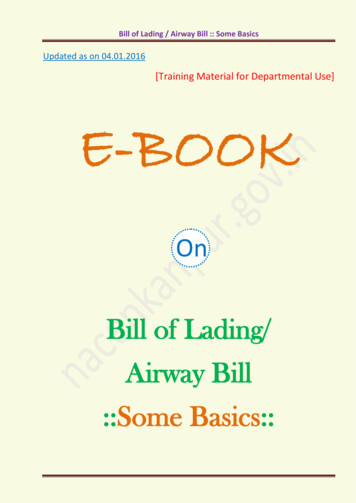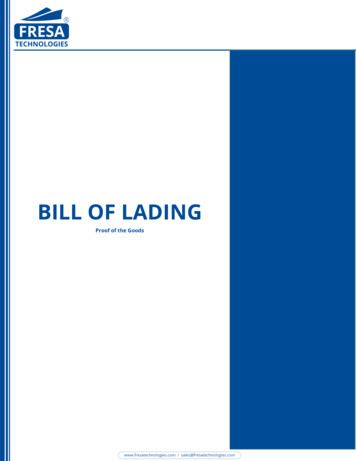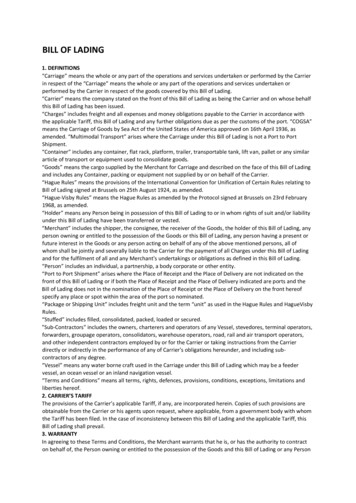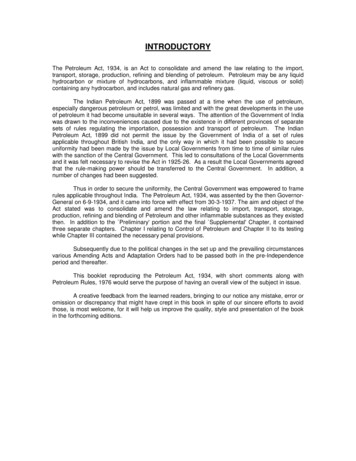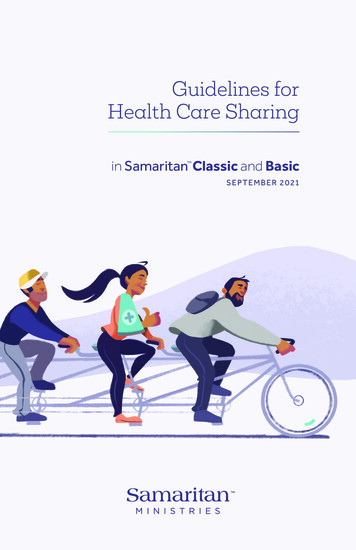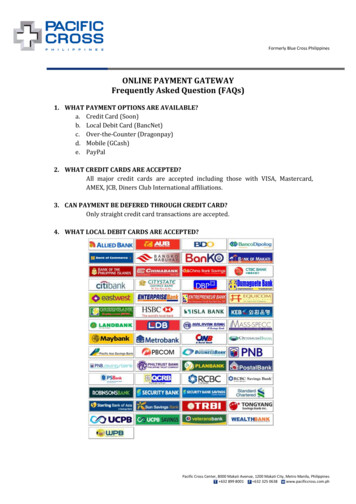
Transcription
Bills of Lading – 101March 27, 2017
PROPRIETARY & CONFIDENTIALBills of Lading - OverviewWhat is a Bill of Lading?The function of a Bill of LadingLifecycle of a bill of ladingTypes of bills of ladingBills of lading and the BankDo’s and Don’tsQuestions?
PROPRIETARY & CONFIDENTIALWhat is a Bill of Lading? Document of goods received May be negotiable Must be an agreed upon form Typically issued with 3 originalsA Bill of Lading can also be shown orknown as: BL, B/L or BOL
PROPRIETARY & CONFIDENTIALWhat is a Bill of Lading? Background – 11th century – 14th century – 1789 - 2017
PROPRIETARY & CONFIDENTIALThe function of a bill of lading Documentary Evidence of Receipt of Cargo Contract of Carriage Document of TitleThe version of the form must be agreed upon.The fine print on a BL dictates what rules, obligations and liabilities the shipperand carrier have to each other.
PROPRIETARY & CONFIDENTIAL
PROPRIETARY & CONFIDENTIALDon’tforget toread thefine print
PROPRIETARY & CONFIDENTIALThe Lifecycle of a bill of ladingIssued to by carrier, or their agents, when cargo is loadedOriginals are released to shipper when freight terms are metBL’s are sometimes negotiated for Letter of Credit funds release as payment for thegoods or the receivers pay the shipper directly for the cost of the merchandiseShippers or their bank sends the original bills of lading to the consignee orreceivers as directed by the buyers once payment for the goods has been madeto the shippersOriginal bills of lading are presented to carrier(The ship’s master or the carrier’s agents at the destination port)Cargo is unloaded and delivered to receivers or the consignee who first presents oneof the original bills of lading. Once one original bill of lading has been presented, allother originals immediately become void
PROPRIETARY & CONFIDENTIALThe types of bills of ladingInland bill of ladingOcean bill of ladingThrough bill of ladingWaybill (Sea and Air)
PROPRIETARY & CONFIDENTIALBills of Lading and the BankBill of Ladingand othersupportingdocumentspresented to bankby sellerSeller gets fundsreleased to themfor payment ofthe goods
PROPRIETARY & CONFIDENTIALLetters of CreditAbbreviations for a Letter of Credit include L/C,LC, and LOCBuyers Request LC FromTheir BankApplicant - the buyer in a transactionBuyer's Bank Issues LC to SellerBeneficiary - the seller or ultimate recipient offundsIssuing bank - the bank that promises to payAdvising bank - helps the beneficiary use theletter of creditCarrier prepares Bill of Lading whencargo is loaded and gives originalbill of lading to shipper (seller)when freight is paidSeller Presents Required DocumentsSpecified in theLC to BankBuyers Bank Pays Seller
PROPRIETARY & CONFIDENTIALLoad port Do’s Get bill of lading instructions fromshipper and watch for specialinstructions from principal Follow instructions Get authority to sign Send proforma copies Get approval of content from client Verify that loaded quantities matchother documents exactly Get approval to release Stamp originals & non-negotiablecopies Release as AND when instructed
PROPRIETARY & CONFIDENTIALDischarge Port Do’s Collect at least one original B/L Advise principal about whencollected If no original available – followowner’s instructions Only owners can decide toaccept a Letter of Indemnity View original B/L and look forpotential fraud (photocopy oforiginal? – NO) If questionable, alert principalor master
PROPRIETARY & CONFIDENTIALBill of Lading Don’tsDo not handle bills of lading if you have not been trained to do soDo not issue a corrected set of a bill of lading without collecting and cancelling the first setDon’t release bills of lading that you know to have false information onDo not release bills of lading without getting authorization to do soDo not release cargoes without collection of an original of a bill of lading or the principal’swritten permissionDo not be afraid to ask questions when you are not sure of anything related to bills of lading
PROPRIETARY & CONFIDENTIAL
Bill of Lading Don'ts Do not handle bills of lading if you have not been trained to do so Do not issue a corrected set of a bill of lading without collecting and cancelling the first set Don't release bills of lading that you know to have false information on Do not release bills of lading without getting authorization to do so


